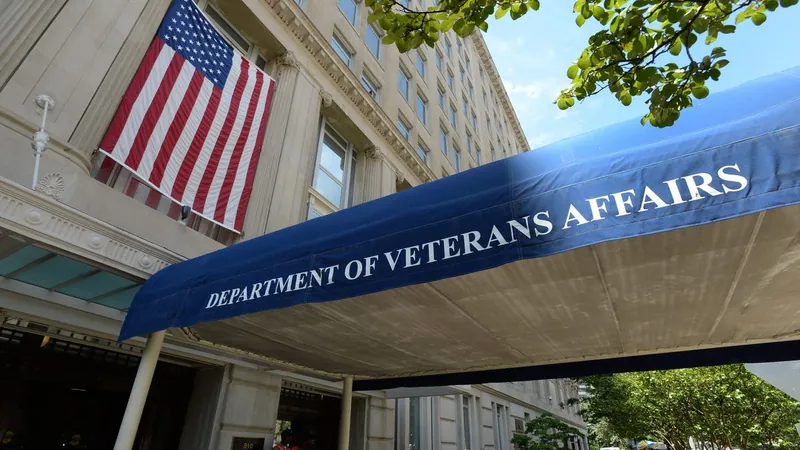
Supreme Court Deliberates Over Veterans' Disability Benefits: A Decision That Could Transform Lives
2024-10-16
Author: Wai
Supreme Court Deliberates Over Veterans' Disability Benefits: A Decision That Could Transform Lives
As the Supreme Court hears pivotal arguments on veterans' disability benefit denials, the stakes are exceptionally high for countless veterans across the nation. The case, spotlighting individuals like Norman Thornton and Joshua Bufkin, could indeed reshape how the U.S. Department of Veterans Affairs (VA) evaluates benefit claims.
Thornton, a veteran of the Gulf War, believes the VA wrongfully downgraded his disability rating related to post-traumatic stress disorder (PTSD). Similarly, Bufkin's appeal for PTSD benefits was denied after conflicting medical assessments left him in limbo regarding his mental health status following his service. Both veterans faced arduous paths to have their cases evaluated by a special veterans court—but that court ultimately sided with the VA against them.
In a hearing on Wednesday, the Supreme Court examined how the U.S. Court of Appeals for Veterans Claims should approach benefit denials, especially in ambiguous situations where the evidence is not clear-cut. This crucial review could have "profound implications for untold numbers of veterans," as articulated by the legal teams representing Thornton and Bufkin.
Many veterans' organizations advocate for a system where veterans are granted the benefit of the doubt in disability determinations, reinforcing a practice that has been supported by Congress for more than a century. Notably, in 1988, the establishment of the Veterans Court aimed to ensure fair treatment in disputed disability claims. However, dissatisfaction remains among veterans' groups, who argue the court often favors the VA's positions without meaningful scrutiny.
Legal history has shown that even legislative attempts to ensure veterans are favored in their claims have been met with hurdles. For instance, Congress in 2002 insisted that the Veterans Court must "take due account" of the VA's duty towards the benefit-of-the-doubt principle. Yet, even with these guidelines in place, critics argue that the court functions too frequently as a mere rubber stamp for VA decisions.
Justice Clarence Thomas raised a pressing concern during the proceedings, questioning whether accepting the government’s stance would render Congress's important provisions essentially meaningless. The Justice Department attempted to clarify that Congress intended the language to not only remind the court of its responsibilities but to ensure a thorough evaluation of veterans’ circumstances.
The complexities surrounding Bufkin and Thornton's cases highlight the pressing need for a precise and empathetic review process. Bufkin contends that his emotional trauma, exacerbated by a marital crisis connected to his military service, wasn't fully considered in the VA's evaluation. Meanwhile, Thornton argues that the impact of his "dissociative episodes" warranted a higher disability classification than the VA determined.
The federal government maintains that both cases did not present "close calls," asserting that the evidence against the veterans' claims was overwhelming. Thornton's history of employment difficulties and social anxieties led the VA to set his rating at 50%, a number he argues should be elevated based on more comprehensive medical evaluations.
Legal experts anticipate that a ruling in this landmark case, Bufkin v. McDonough, could reshape the landscape of veterans' benefits, driving more attention to the emotional and psychological toll of military service. The decision is expected by summer, a timeline that veterans and advocates will be watching closely, as they hope for a turning point that recognizes their sacrifices more adequately and fairly.
Stay tuned for updates on this crucial case that could alter the future for countless veterans seeking the benefits they rightfully deserve!




 Brasil (PT)
Brasil (PT)
 Canada (EN)
Canada (EN)
 Chile (ES)
Chile (ES)
 España (ES)
España (ES)
 France (FR)
France (FR)
 Hong Kong (EN)
Hong Kong (EN)
 Italia (IT)
Italia (IT)
 日本 (JA)
日本 (JA)
 Magyarország (HU)
Magyarország (HU)
 Norge (NO)
Norge (NO)
 Polska (PL)
Polska (PL)
 Schweiz (DE)
Schweiz (DE)
 Singapore (EN)
Singapore (EN)
 Sverige (SV)
Sverige (SV)
 Suomi (FI)
Suomi (FI)
 Türkiye (TR)
Türkiye (TR)